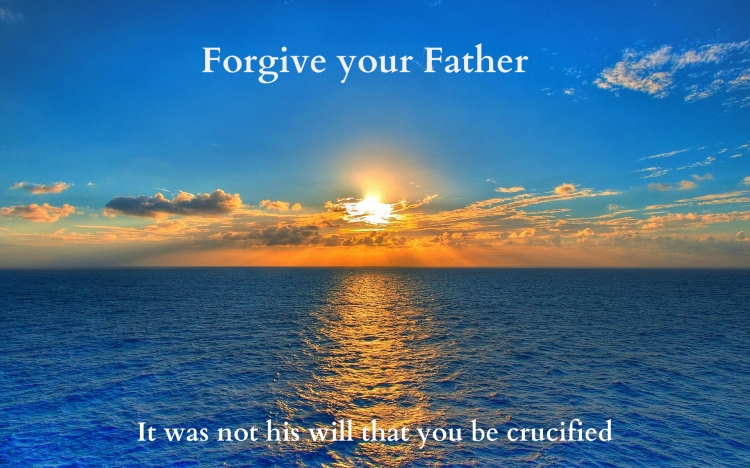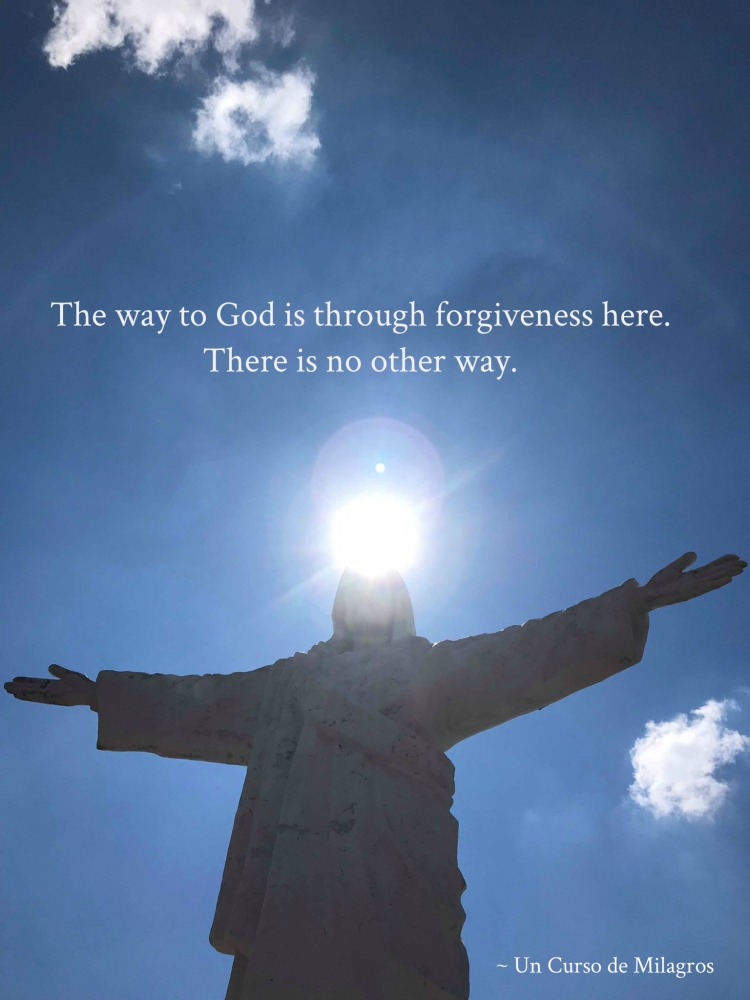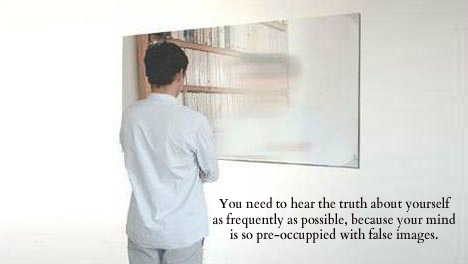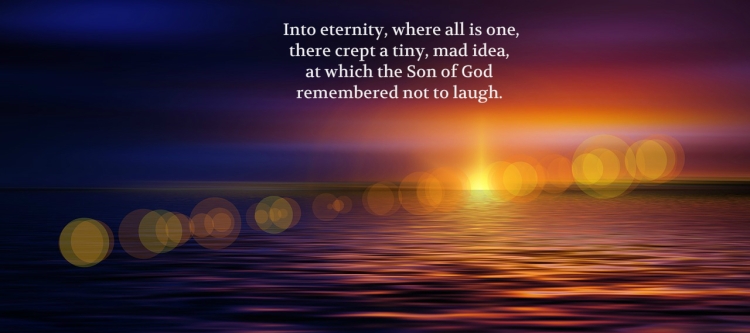ACIM Text Reading for June 23
Chapter 20
THE VISION OF HOLINESS
This is Palm Sunday, the celebration of victory and the acceptance of the truth. Let us not spend this holy week brooding on the crucifixion of God’s Son, but happily in the celebration of his release. For Easter is the sign of peace, not pain. A slain Christ has no meaning. But a risen Christ becomes the symbol of the Son of God’s forgiveness on himself; the sign he looks upon himself as healed and whole.
This week begins with palms and ends with lilies, the white and holy sign the Son of God is innocent. Let no dark sign of crucifixion intervene between the journey and its purpose; between the acceptance of the truth and its expression. This week we celebrate life, not death. And we honour the perfect purity of the Son of God, and not his sins. Offer your brother the gift of lilies, not the crown of thorns; the gift of love and not the ‘gift’ of fear. You stand beside your brother, thorns in one hand and lilies in the other, uncertain which to give. Join now with me and throw away the thorns, offering the lilies to replace them. This Easter I would have the gift of your forgiveness offered by you to me, and returned by me to you. We cannot be united in crucifixion and in death. Nor can the resurrection be complete till your forgiveness rests on Christ, along with mine.
A week is short, and yet this holy week is the symbol of the whole journey the Son of God has undertaken. He started with the sign of victory, the promise of the resurrection, already given him. Let him not wander into the temptation of crucifixion, and delay him there. Help him to go in peace beyond it, with the light of his own innocence lighting his way to his redemption and release. Hold him not back with thorns and nails when his redemption is so near. But let the whiteness of your shining gift of lilies speed him on his way to resurrection.
Easter is not the celebration of the cost of sin but of its end. If you see glimpses of the face of Christ behind the veil, looking between the snow white petals of the lilies you have received and given as your gift, you will behold your brother’s face and recognise it. I was a stranger and you took me in, not knowing who I was. Yet for your gift of lilies you will know. In your forgiveness of this stranger, alien to you and yet your ancient Friend, lies his release and your redemption with him. The time of Easter is a time of joy, and not of mourning. Look on your risen Friend, and celebrate his holiness along with me. For Easter is the time of your salvation, along with mine.
***
ACIM Workbook Lesson for June 23
Lesson 169
By grace I live. By grace I am released.
1. Grace is an aspect of the Love of God which is most like the state prevailing in the unity of truth. It is the world’s most lofty aspiration, for it leads beyond the world entirely. It is past learning, yet the goal of learning, for grace cannot come until the mind prepares itself for true acceptance. Grace becomes inevitable instantly in those who have prepared a table where it can be gently laid and willingly received; an altar clean and holy for the gift.
2. Grace is acceptance of the Love of God within a world of seeming hate and fear. By grace alone the hate and fear are gone, for grace presents a state so opposite to everything the world contains, that those whose minds are lighted by the gift of grace can not believe the world of fear is real.
3. Grace is not learned. The final step must go beyond all learning. Grace is not the goal this course aspires to attain. Yet we prepare for grace in that an open mind can hear the Call to waken. It is not shut tight against God’s Voice. It has become aware that there are things it does not know, and thus is ready to accept a state completely different from experience with which it is familiarly at home.
4. We have perhaps appeared to contradict our statement that the revelation of the Father and the Son as one has been already set. But we have also said the mind determines when that time will be, and has determined it. And yet we urge you to bear witness to the Word of God to hasten the experience of truth, and speed its advent into every mind that recognizes truth’s effects on you.
5. Oneness is simply the idea God is. And in His Being, He encompasses all things. No mind holds anything but Him. We say “God is,” and then we cease to speak, for in that knowledge words are meaningless. There are no lips to speak them, and no part of mind sufficiently distinct to feel that it is now aware of something not itself. It has united with its Source. And like its Source Itself, it merely is.
6. We cannot speak nor write nor even think of this at all. It comes to every mind when total recognition that its will is God’s has been completely given and received completely. It returns the mind into the endless present, where the past and future cannot be conceived. It lies beyond salvation; past all thought of time, forgiveness and the holy face of Christ. The Son of God has merely disappeared into his Father, as his Father has in him. The world has never been at all. Eternity remains a constant state.
7. This is beyond experience we try to hasten. Yet forgiveness, taught and learned, brings with it the experiences which bear witness that the time the mind itself determined to abandon all but this is now at hand. We do not hasten it, in that what you will offer was concealed from Him Who teaches what forgiveness means.
8. All learning was already in His Mind, accomplished and complete. He recognized all that time holds, and gave it to all minds that each one might determine, from a point where time was ended, when it is released to revelation and eternity. We have repeated several times before that you but make a journey that is done.
9. For oneness must be here. Whatever time the mind has set for revelation is entirely irrelevant to what must be a constant state, forever as it always was; forever to remain as it is now. We merely take the part assigned long since, and fully recognized as perfectly fulfilled by Him Who wrote salvation’s script in His Creator’s Name, and in the Name of His Creator’s Son.
10. There is no need to further clarify what no one in the world can understand. When revelation of your oneness comes, it will be known and fully understood. Now we have work to do, for those in time can speak of things beyond, and listen to words which explain what is to come is past already. Yet what meaning can the words convey to those who count the hours still, and rise and work and go to sleep by them?
11. Suffice it, then, that you have work to do to play your part. The ending must remain obscure to you until your part is done. It does not matter. For your part is still what all the rest depends on. As you take the role assigned to you, salvation comes a little nearer each uncertain heart that does not beat as yet in tune with God.
12. Forgiveness is the central theme that runs throughout salvation, holding all its parts in meaningful relationships, the course it runs directed and its outcome sure. And now we ask for grace, the final gift salvation can bestow. Experience that grace provides will end in time, for grace foreshadows Heaven, yet does not replace the thought of time but for a little while.
13. The interval suffices. It is here that miracles are laid; to be returned by you from holy instants you receive, through grace in your experience, to all who see the light that lingers in your face. What is the face of Christ but his who went a moment into timelessness, and brought a clear reflection of the unity he felt an instant back to bless the world? How could you finally attain to it forever, while a part of you remains outside, unknowing, unawakened, and in need of you as witness to the truth?
14. Be grateful to return, as you were glad to go an instant, and accept the gifts that grace provided you. You carry them back to yourself. And revelation stands not far behind. Its coming is ensured. We ask for grace, and for experience that comes from grace. We welcome the release it offers everyone. We do not ask for the unaskable. We do not look beyond what grace can give. For this we can give in the grace that has been given us.
15. Our learning goal today does not exceed this prayer. Yet in the world, what could be more than what we ask this day of Him Who gives the grace we ask, as it was given Him?
By grace I live. By grace I am released.
By grace I give. By grace I will release.
***
ACIM Q & A for Today
Why does A Course in Miracles use masculine language in denoting the Trinity? Is Jesus a sexist?
No, Jesus is not a sexist, nor was the Course’s scribe, Helen Schucman a reverse one. Indeed, A Course in Miracles is written linguistically within the male-dominated Judaeo-Christian tradition, and uses the patriarchal biblical language on which that tradition is based. Consequently, the Course conforms to this religious culture by using Trinitarian terms that are exclusively masculine. It must be understood, however, that the Trinity is neither masculine nor feminine, and the Holy One knows nothing of gender, since It did not create bodies. This point is a further testimony to the difference between the biblical creator-God and the God of A Course in Miracles. In fact, Jesus himself speaks of his use of ego-oriented language:
This course remains within the ego framework, where it is needed….
It uses words, which are symbolic, and cannot express what lies
beyond symbols (manual, p. 73; C-in.3:1,3).
And so it is clear that the Course’s meaning in using this masculine language lies elsewhere. While the form of the Course’s words is the same as the twenty-five-hundred-year-old Western tradition, its content is exactly the opposite. This provides a good example of a principle enunciated twice in the text, that the Holy Spirit does not take our special relationships (the form) away from us, but instead transforms them (by changing their purpose — the content) (text, pp. 333, 351; T-17.IV.2:3-6; T-18.11.6). Therefore, the reader is given a wonderful opportunity to practice forgiveness by having whatever buried judgmental thoughts are unconsciously present be raised to awareness by the Course’s “sexist” language, so that they may now be looked at differently with the Holy Spirit’s help. In this way, a special hate (or love) relationship with patriarchal authorities — religious or secular — may be transformed into a holy relationship, the relationship now having forgiveness and peace as its purpose, instead of judgment and attack.
In like manner, we can understand the Course’s usage of the term Son of God. For two thousand years, it has exclusively been used in Christian theology to denote only Jesus, the biblical God’s only begotten Son, and Second Person of the Trinity. Moreover, Jesus’ specialness was accentuated by St. Paul’s relegating the rest of humanity to the status of “adopted sons” of God (Galatians 4:4). To accentuate the point that he is our equal, Jesus in A Course in Miracles uses the same term that heretofore had excluded everyone except himself. Now, however, it denotes all people: God’s children who yet believe they are bodies and separate from their Source and therefore different from Him. And even more specifically, the term Son of God denotes the students who are reading and studying A Course in Miracles, a usage clearly made regardless of their gender.
This term is thus deliberately used to help correct two thousand years of what A Course in Miracles sees as Christianity’s distortion of Jesus’ basic message, in this case the perfect equality and unity of the Sonship of God. And so in the Course Jesus presents himself as no different from anyone else in reality (although certainly he is different from us in time). Therefore, to state it once again, the same term — Son of God — that was used only for Jesus is now used for all of us. Moreover, the term is also used to denote Christ, God’s pre-separation creation, His one Son. Again, we see usage of the same form as in traditional Christianity, but with a totally different content. The phrase Son of Godcan also be easily understood as synonymous with child, a term which is also often used in the Course.
The reinterpretation of Son of God from exclusive to totally inclusive is crucial to the Course’s thought system. And because of Jesus’ reason for using this term, students — men and women alike — should be vigilant against the temptation to change the Course’s “offensive” language. While such practice is understandable, it does serve to undermine one of Jesus’ pedagogical purposes. It would be much more in keeping with the teachings of A Course in Miracles to leave the form as it is, and change one’s mind instead. In these circumstances, one would do well to paraphrase a famous line from the text: Therefore, seek not to change the course, but choose to change your mind about the course (text, p. 415; T-2l.in.1:7). Therefore, since the Course’s form will not be changed, students would be wise to use their reactions as a classroom in which they can learn to forgive, not only Jesus, Helen, or A Course in Miracles itself, but also all those in the past (or present) who have been perceived as treating them or others unfairly.
One final note on the subject of the Course’s masculine language: It has long been a grammatical convention that pronouns referring back to a neuter noun, such as “one” or “person,” take the masculine form of “he.” Clearly, since a central teaching of A Course in Miracles is that we are not bodies — and so the members of the Trinity are not bodies either — the issue, once again, is merely one of form or style.










